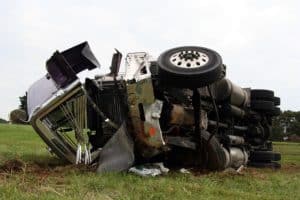Virginia Beach Truck Accident FAQ

Frequently Asked Questions for Truck Accidents in Virginia
Semi-truck accidents can be incredibly devastating to those involved, and they are far more common than most people realize. Because of their size and the speed they travel, tractor-trailer wrecks often have profound consequences, including severe injuries and costly property damage. The worst cases result in death. Typically the occupants of the lighter vehicles involved fare worse.
The aggressive trial lawyers at Ruloff, Swain, Haddad, Morecock, Talbert, and Woodward are committed to protecting victims of truck accidents in Virginia’s Tidewater region. We are here to help victims secure the compensation they need to pay their medical bills, replace lost wages, and move on with their lives.
It is not uncommon for victims of these serious accidents to have questions about their rights and options, which is why we’ve provided the answers to some frequently asked questions below. For personalized answers to your specific questions, contact us today for a free consultation.
How common are truck accidents in Virginia?
As a major transportation hub on the East Coast, truck accidents are, unfortunately, a common occurrence on Virginia highways, particularly with the large number of trucks traveling to and from the ports in the Hampton Roads region.
According to the Virginia DMV, large trucks were responsible for 45 fatal crashes in a single recent year. Trucks also caused 822 crashes with injuries and led to property damage in 1,439 instances. The total number of crashes, 2,306, made up about 2% of all crashes in Virginia.
The causes of truck accidents in Virginia often involved improper lane changing and following too closely (resulting in 13% and 9.5% of all accidents, respectively). Improper turning (2.9%) and speeding (2.6%) were also major causes.
What are some common truck accident injuries?
Unfortunately, due to their size and weight, accidents involving semi-trucks often result in more serious injuries than collisions involving only passenger vehicles. Some injuries may be less severe, such as:
- Broken bones
- Serious cuts, scrapes, and bruises
- Neck injuries, such as whiplash
- Back injuries, such as strains or herniated discs
- Soft tissue injuries to muscles and joints
However, truck accidents are very likely to lead to more serious injuries, such as:
- Traumatic brain injuries (TBI)
- Spinal cord injuries, including paralysis
- Amputations
- Severe burns
- Injuries to internal organs
- Death
In addition, there may be emotional damage done that causes long-term psychological damage. These issues can include:
- Depression
- Anxiety
- Sleeplessness
- Phobias associated with driving
- Post-traumatic stress disorder (PTSD)
A truck accident can be life-changing or life-ending. Anyone who has been in a truck accident will likely have extensive injuries that require a great deal of medical attention.
How does the truck accident claims process work in Virginia?
When a truck driver causes an accident, the victims should not have to pay for expenses related to the injuries they suffer. If they pursue a claim against the truck driver, the trucking company, or another responsible party, they may be able to recover damages such as:
- Medical expenses, including long-term treatment and care
- Lost wages
- Loss of future earning capacity
- Pain and suffering
- Emotional distress
- Wrongful death
For the best chance of securing appropriate compensation, you should consult with a truck accident attorney. They will be able to investigate your accident, work with experts, and pursue your claim.
This process can take a significant amount of time and can seem complex and confusing to those not used to it. The claims process may involve these steps:
- Insurance companies and your lawyer perform initial evaluations.
- Your attorney will negotiate for a fair settlement that covers your needs.
- If negotiations do not result in a fair settlement offer, you can file a lawsuit.
- A period of discovery will follow for your lawyer to develop the case.
- Depositions will then allow for more evidence to be gathered and interrogatories (questions) to be filled out.
- The parties may then reach a settlement.
- If a settlement is not reached, a trial will commence in which a jury decides the outcome.
Not all cases involve all of these steps. Sometimes, an insurance company will pay fully in the earliest stages. Other times, a settlement is reached quickly once the lawsuit process begins. However, it is always possible your case will end up going all the way to trial.
Do truck drivers and trucking companies have insurance coverage for truck accidents?
Because truck accidents occur often and can cause severe injuries and property damage, truckers and trucking companies are required to have extensive insurance coverage – typically with limits well above the normal car driver. This coverage allows victims to potentially recover full compensation even when losses are significant. However, it also means that claims must go through an insurance company that is well prepared to contest claims with very experienced lawyers who handle claims like these regularly. You will need an experienced, tough lawyer of your own to fight their attempts to deny you compensation.
Who is liable for a truck accident?
Liability in a truck accident could be attributed to many factors, which are not always the driver’s actions alone.
To prove liability, your lawyer will need to prove that the truck driver or some other party was at fault through some form of negligence. They may also find negligence on the part of the trucking company, the truck parts manufacturer (when truck parts fail), local government (when the roads have not been kept in good condition), or others.
If the truck driver is found liable, your lawyer mat need establish that an employment relationship exists between the driver and the trucking company in order to tap coverage under the company’s policy. At this point, those responsible can be found legally liable, and they can be compelled to pay damages.
What is the deadline to file a claim in Virginia?
In the event of a truck accident, every state has a statute of limitations. In other words, there is a time limit in which the victim can file an injury claim.
In Virginia, your claim must be filed within two years of the date of your truck accident. This is an important date to keep in mind. Since injuries can be very serious and expenses very high, it is easy to lose track of time and miss this deadline. Once the deadline is missed, it is almost impossible to file a claim.
What evidence is needed to prove a truck accident claim?
To prove your claim, your lawyer will need to investigate the crash and collect evidence that will support it. Critical pieces of evidence often include:
- Evidence of road and weather conditions
- Evidence of driver’s distraction or use of drugs or alcohol
- Witness statements
- Police reports
- Evidence of injuries from doctors and other medical experts
- Photographs of the accident and injuries
- Information from the truck’s “black box”
- Truck driver’s logbooks, to check and see if they worked long hours because of a truck driver shortage
- Phone records
- Maintenance records
This is by no means an exhaustive list. Your lawyer will know best which kinds of evidence are necessary to best develop and prove your case.
Contact Our Virginia Truck Accident Lawyers Now for Answers to Your Questions
Dealing with the physical and financial effects of a collision with a tractor-trailer can be stressful on you and your family. The pain, the bills, and the fear of a lost future can make it seem impossible to return to the life you once lived before the accident.
Fortunately, help is available. The Virginia Beach truck accident lawyers of Ruloff, Swain, Haddad, Morecock, Talbert, and Woodward have what it takes to help you get back on your feet. We have helped others just like you get the full compensation and justice that they deserve, and we’re ready to do the same for you.
To schedule a consultation to discuss your claim, call us or contact us online today.
